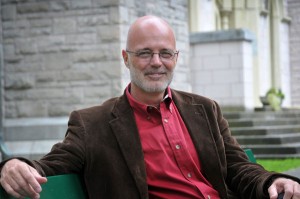Brian McLaren served in pastoral ministry for twenty years as the founding pastor of Cedar Ridge Community Church. In 2006, he stepped down from that role to devote his time to writing and speaking. McLaren has written over a dozen books, including Naked Spirituality: A Life with God in 12 Simple Words (2011 – read my review), A New Kind of Christianity (2010), and Everything Must Change: When the World’s Biggest Problems and Jesus’ Good News Collide (2009). He has taught or lectured at many seminaries and has served on a number of boards, including Emergent Village, Sojourners, Mars Hill Graduate School,International Teams, and Off The Map, and he is a founding member of Red Letter Christians. He was named one of America’s 25 most influential evangelicals by Time magazine. For more information, visit his website.
Book Basics
Far too many Christians live into their religious identity in a multi-faith world either by displaying a strong Christian identity that responds negatively toward other religions or by exercising a weak Christian identity that seeks to minimize inter-religious differences. In contrast, McLaren proposes a strong and benevolent approach to Christian identity. After providing context for this new framework, he explores three challenges: doctrinal, liturgical, and missional.
McLaren isn’t proposing minor tweaks to the typical Evangelical perspective; he seeks to help enact the Great Reformulation. In part this involves “faithfully reformulating orthodoxy by treating its oppositional, hostile, and imperial malignancies” (p.156). It requires those committed to a different future to “bring the appropriate amount, kind, and pace of creative disturbance to the system, and then to participate in the often messy but always exciting process of renewal, reform, and refounding, depending on the Spirit of God to guide and energizes, to correct and reorient, as the reformulation unfolds” (p.159).
These shifts should result in a radical revisioning of the church year, a willingness to approach the bible seriously not literally, and new ways of being together in discipleship activities for all ages. They should empower followers of Jesus to become agents of subversive friendship, learning to give and receive hospitality by moving toward the other in genuine ways. Only as Christians attain or refocus their Christian identity through these friendships can they effectively move with the other to serve a world filled with people in need.
So What?
Every religious tradition has a rich history. In the current multi-faith world no religion exists in isolation. McLaren argues that we live in a unique time when the world’s religions are at a crossroads. People of each religion must choose whether to stand their ground and interact from a distance with words and actions that fail to fully embrace the others or to cross the road and truly encounter one another.
So imagine, then, Jesus, Moses, the Buddha, and Mohammed crossing the road to encounter one another. Imagine us following them. What will we discover in that crossing (p.273)?
Will you (are you) cross(ing) the road to genuinely encounter the religious other? What do you expect to learn as you do so?
Brian D. McLaren. Why Did Jesus, Moses, the Buddha, and Mohammed Cross the Road? Christian Identity in a Multi-Faith World (Jericho Books, 2012). ISBN: 9781455513963.
